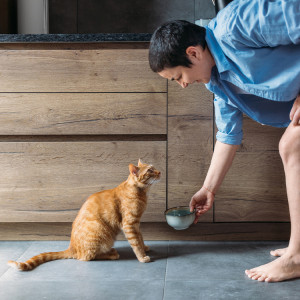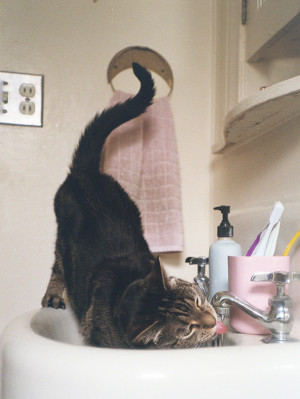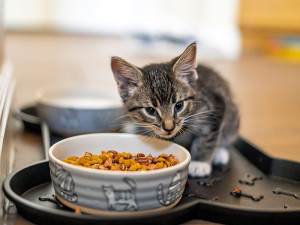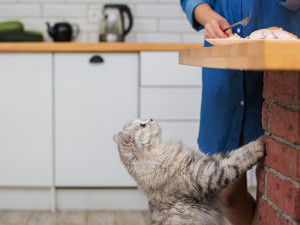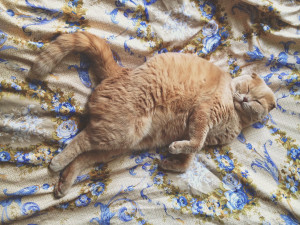Can Cats Drink Milk?
The movies would have you believe they can.

Share Article
In This Article:
Is Milk Bad for Cats?opens in a new tab Can Cats Be Lactose Intolerant?opens in a new tab Are There Any Health Benefits to Milk for Cats?opens in a new tab Can Milk Cause Health Symptoms in Cats?opens in a new tab What Can I Give My Cat Instead of Milk?opens in a new tab Can a Kitten Have Milk?opens in a new tab When Should You Give Kittens Water?opens in a new tab Frequently Asked Questionsopens in a new tab
The idea of giving cats a saucer of milk goes back generations. But can cats actually drink milk? Cats can safely eat lots of “people foods,” and some human foods are even healthy for cats. But before giving your cat any human food, it’s always a good idea to do a little research to make sure it’s OK. Let’s find out if cats can drink milk, and if so, what kind of milk. Yes, cats can drink milk; it’s not toxic to them. But it’s not good for them.

littleKin™ is Kinship’s home just for puppy and kitten parents. Bop over to check out expert advice, new pet tools, and special deals—all curated for your newest family member.
opens in a new tabIs milk bad for cats?
According to veterinarian Dr. Preston Turanoopens in a new tab, milk products, especially whole milk and cream, contain a lot of fats and sugars. If given regularly, milk can cause cats to become overweight.
Can cats be lactose intolerant?
Not all cats are lactose intolerant, but many cats are unable to digest milk properly, which can lead to digestive upset and other problems.
“Once kittens are done nursing and start to mature, they often stop making the enzyme that breaks down milk, making them lactose intolerant,” Dr. Turano says. “When these cats drink milk it can cause vomiting, diarrhea, abdominal pain, and flatulence.”
Are there any health benefits to milk for cats?
Milk does contain a lot of healthy nutrients, including protein, calcium, phosphorus, and vitamins. However, for cats, any health benefits are outweighed by the downsides of milk, including its fat and sugar content, and the fact that many cats are lactose intolerant and might develop an upset tummy if they drink milk.
What are milk supplements?
Milk supplements are specially made for orphaned kittens, so they can be bottle-fed opens in a new tabuntil they are old enough to be weaned. For these kittens, you can buy kitten milk replacer (KMR) in liquid or powdered form. KMR is much like formula for human babies. It’s designed to provide all the nutrition a growing kitten needs.
Can milk cause health symptoms in cats?
Yes, milk can cause health symptoms in cats that are lactose intolerant. Drinking milk can cause these cats to have tummy pain or discomfort, and develop diarrhea and vomiting. They might also be very gassy after drinking milk.
What can I give my cat instead of milk?
In addition to milk, lactose is found in other dairy products like yogurt, ice cream, and cheese. In general, these are not foods cats should be eating regularly. Cats are obligate carnivores, which means the majority of their diet should be meat. Cats have no nutritional need for any milk or dairy products.
Of course, it can be so hard to resist your adorable cat when they’re begging for a lick of your ice cream or yogurt. The good news is, if your cat wants an occasional taste of dairy foods, it’s not likely to cause too many problems.
“If a cat seems to really like a dairy product and it doesn’t upset their stomachs, then it’s probably OK in moderation,” says Dr. Chris Konvalinka, veterinarian at Bahama Road Veterinary Hospital in Bahama, North Carolina.
Dr. Turano says the same: If your cat really likes milk and appears to have no side effects from drinking it, you can allow a teaspoon as a treat one or two times a week.
“Goat milk has less lactose than cow milk and it’s easier to digest, so your cat may tolerate it better,” Dr. Turano says. “It can help with the gut flora and can decrease inflammation, but you should talk with your veterinarian or integrative veterinarian about whether your cat would benefit from goat milk or any other types of milk before adding it to their diet.”
Another option is lactose-free cat milk. These products are designed specifically for cats and are intended to be fed in small amounts as an occasional treat.
Can a kitten have milk?
If kittens are not old enough to eat kitten food, they need kitten milk replacer (KMR, or kitten formula). Nursing kittens should not drink cow’s milk or goat milk, which is not nutritionally balanced for a kitten’s needs. Older kittens who are eating kitten food do not need milk, though some people make a gruel of KMR and kitten food when kittens are first transitioning.
When should you give kittens water?
Very young kittens who are nursing or drinking kitten formula do not need to drink water separately because they get all the hydration they need from their mother’s milk or the kitten formula. You can offer water around four weeks of ageopens in a new tab, when the kittens start the weaning process and begin tasting solid kitten food. Most kittens this age are still taking in mostly milk rather than a lot of food, so they are very hydrated and might not drink a lot of water, but this is normal.
FAQs
What kind of milk can I give my cat?
Cats don’t need milk — it’s high in sugar and fat, and is not a biologically appropriate food for cats. Cats are obligate carnivores and should eat a primarily meat-based diet. Many cats are lactose intolerant, so milk can even cause stomach upset (vomiting, diarrhea, stomach pain, and flatulence).
What happens if a cat drinks a little bit of milk?
If a cat drinks a little milk, what happens next depends on whether or not the cat is lactose intolerant (which is the case for many cats). A lactose intolerant cat might suffer from an upset tummy, such as vomiting and diarrhea, even if they only drink a little bit of milk. Some cats can drink small amounts of milk and suffer no ill effects, but don’t give milk frequently or in large amounts, as it can unbalance their diet or cause unwanted weight gain.
What drinks can cats have?
A cat’s main drink should be fresh, clean water. Some cats don’t drink enough water, and dehydration can be a concern when cats are recovering from an illness or injury. Check with your vet first, but you can usually add small amounts of tuna juice (from tuna canned in water) or unseasoned, low-sodium chicken broth to their water to encourage them to drink more.
References
Cornell University College of Veterinary Medicine. “Feeding Your Cat.” Cornell University College of Veterinary Medicine, 16 Oct. 2017, www.vet.cornell.edu/departments-centers-and-institutes/cornell-feline-health-center/health-information/feline-health-topics/feeding-your-catopens in a new tab.
“Milk Prebiotics Are the Cat’s Meow, Illinois Research Shows | College of Agricultural, Consumer & Environmental Sciences | Illinois.” Illinois.edu, 2021, aces.illinois.edu/news/milk-prebiotics-are-cats-meow-illinois-research-showsopens in a new tab. Accessed 26 Nov. 2024.
Staff, Hastings. “Are Cats Allowed to Drink Milk?” Hastings Veterinary Hospital, 15 Nov. 2019, hastingsvet.com/are-cats-allowed-to-drink-milk-the-answer-is-no-heres-why/opens in a new tab.
“Vet Q&A: Can Cats Drink Milk?” Pdsa.org.uk, 2020, www.pdsa.org.uk/what-we-do/blog/vet-qa-can-cats-drink-milkopens in a new tab. Accessed 26 Nov. 2024.
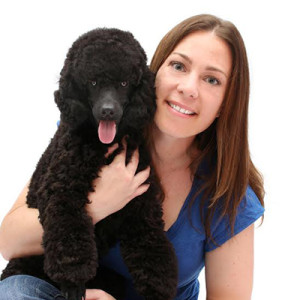
Jackie Brown
Jackie Brown lives in sunny Orange County, CA, where she works as a freelance writer and editor. When she’s not on deadline, you can find her paddling her outrigger canoe in the Pacific Ocean or hiking in the foothills with her miniature poodle and two young boys.
Related articles
- opens in a new tab
Can a Kitten Eat Adult Cat Food?
Uhh, is that safe, little guy?
![Kitten eating dry food from a bowl.]() opens in a new tab
opens in a new tabCan a Kitten Eat Dry Food?
And the nutrients you should make sure they’re getting.
- opens in a new tab
Can You Give a Kitten Milk?
It depends on what kind.
![Cat asking for human food from counter]() opens in a new tab
opens in a new tabWhat Can Cats Eat Besides Cat Food?
Good news for your begging cat: Some of your favorite snacks are safe to share.
![overweight orange cat]() opens in a new tab
opens in a new tabHow Much Should You Actually Be Feeding Your Cat?
If they’ve lost their hourglass figure, then not that much — according to a veterinary nutritionist.
![Cat eating out of metal bowl]() opens in a new tab
opens in a new tabTop 10 Foods That Are Toxic to Cats
Sharing isn’t always caring. Keep your cat safe by keeping these human snack staples to yourself.
